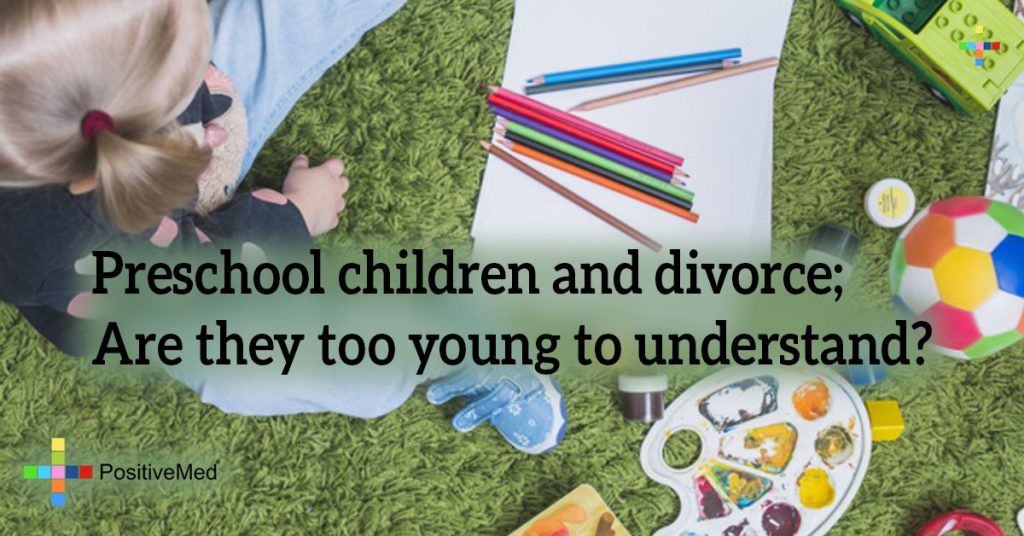
Preschool children and divorce; Are they too young to understand?
By Danielle Jacobs, LMHC
About 50 percent of all marriages in the United States end in divorce and in many cases young children are involved. Divorce is a stressful process and a time of change for all members of the family. Everything that once felt familiar and safe now feels unsafe and uncertain. For adults it means letting go of the dream to grow old together. It involves moving, splitting all assets and liabilities, adjusting to a new financial situation, getting used to being single again, changes in your social life, and dealing with all the emotions that accompany all these changes.
Sometimes, as a parent, you need so much energy to cope with the changes at hand, both emotional and material, that you may forget (or not know how) to explain to your children what is going to change for them and how this might make them feel. As a newly divorced parent, you may simply not be able to foresee what is going to change for your child (and yourself) yet.
Many parents have questions on how to approach their child(ren) regarding divorce-related issues. Sometimes parents don’t know how to talk to their young child(ren) about this sensitive topic. Sometimes parents have the belief that their child will not understand if they try to explain what is going on.

But are preschool children too young to understand about divorce?
The answer is NO. Even preschool children can understand more than you think when you talk to them in developmentally appropriate language. Young children can have intense feelings, but they don’t yet possess the words or the mental capacity to express how they feel. Even if children don’t talk yet, they feel something is going on and ‘speak’ through changes in their behavior.
Some children may express their distress and confusion by showing aggressive or noncompliant behavior. Other children may temporarily regress to an earlier stage in their development where they felt safe and sheltered. Parents and caregivers may notice more clinging or ‘baby-like’ behavior, bedwetting or soiling their pants (when a child was previously potty trained). Regressive behavior is a coping mechanism to deal with feeling unsafe or insecure. Often adults don’t understand, or misinterpret the behavior of a child who is going through the turmoil of a divorce. It is important, while parents are going through a divorce, to be aware of the needs of the children.
If parents fail to give children an explanation they can understand, children may fill in the ‘blanks’ by themselves. Young children often think it is their fault (because they were behaving badly) that their parents are separated.

Here are some tips to help talk to your preschooler about divorce:
• It is important to let children know what is going to happen (For example: “Daddy is moving to another house but you will still see him”).
• Even if you don’t have a clear idea about the parenting plan yet, the child needs to be reassured that the other parent is not leaving him or her.
• Reassure your child that the divorce is not his or her fault.
• Explain that separation is your choice. You and the other parent didn’t get along, and both parents think this is better for all of you.
• Young children don’t need to know details about the reason for divorce.
• They do need to know that, even if parents don’t live together, they never stop being Mommy and Daddy. They keep caring for and loving him or her.
• Don’t punish children for regressive behavior and give them extra attention and reassurance.
For more information, check out Nina Has Two Houses. This illustrated children’s book helps young children and their parents, who are going through a divorce, adjust to the new situation. The book can help explain to the child what he or she may be going through. It can open up the topic of divorce while it gives parents the necessary tools to talk with their children about the situation and accompanying emotions. Many helpful hints for parents and caregivers are included in the book to help parents deal with important co-parenting issues.

Children’s book Nina Has Two Houses is available on Amazon.com in English and Spanish (Nina Tiene Dos Hogares). Like the book on Facebook and find helpful tips for parents on www.facebook.com/NinaHasTwoHouses
Follow Danielle Jacobs, LMHC on Twitter @75748135 for tips on divorce, parenting and relationships.
Danielle Jacobs is a licensed Mental Health Counselor; a Clinical Hypnotherapist, a Florida Supreme Court- certified family mediator, and a qualified parenting coordinator. She is a member of the Florida Academy of Professional Mediators. She is originally from the Netherlands, where she received her Master’s degree in clinical psychology from a well-accredited University in Amsterdam. In the Netherlands, she is licensed as a health-care psychologist specializing in developmental psychology. She currently resides in South Florida, with her husband and young daughter. Ms. Jacobs is the author of Nina Has Two Houses and Nina Tiene Dos Hogares and co-author of To Stay or Not to Stay? Both books are available on Amazon.com.
As a teenager, Jacobs experienced the high-conflict divorce of her parents. This motivated her to help other children and families going through the turmoil of a divorce. After earning her Masters in Psychology, during and after completing her postgraduate education, she worked in a psychiatric inpatient-, and outpatient- clinic for children. She continued her career as a behavioral expert for the Child Protection Service in the Netherlands. In order to advise the Dutch court, she worked closely with child advocates and regularly conducted and reported on parent-child observations and psychological evaluations. Independently, as a forensic, court-appointed expert, she conducted psychosocial and psychological evaluations for a juvenile delinquent population in order to advise the court of Amsterdam.
In her diverse career she has encountered many parents, children, and adolescents from broken or unhappy homes. Through her studies, work, and life experience, Ms. Jacobs has become an expert on the effects of divorce on children and adults. She currently works in private practice in North Miami Beach and leads workshops on parenting, coping with divorce, self-esteem, and relationship repair, prenatal and postpartum depression. She offers individual counseling and hypnotherapy, group, couples, child and family counseling.





